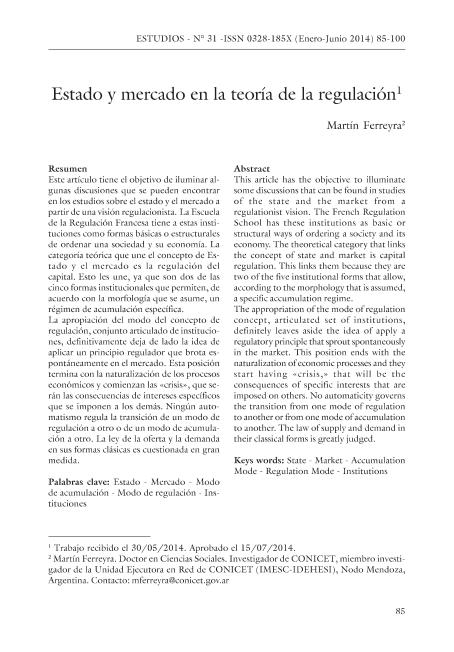Mostrar el registro sencillo del ítem
dc.contributor.author
Ferreyra, Martín Alejandro

dc.date.available
2017-01-24T20:08:44Z
dc.date.issued
2014-08
dc.identifier.citation
Ferreyra, Martín Alejandro; Estado y mercado en la teoría de la regulación; Centro de Estudios Avanzados; Estudios digital; 31; 8-2014; 85-100
dc.identifier.uri
http://hdl.handle.net/11336/11856
dc.description.abstract
Este artículo tiene el objetivo de iluminar algunas discusiones que se pueden encontrar en los estudios sobre el estado y el mercado a partir de una visión regulacionista. La Escuela de la Regulación Francesa tiene a estas instituciones como formas básicas o estructurales de ordenar una sociedad y su economía. La categoría teórica que une el concepto de Estado y el mercado es la regulación delcapital. Esto les une, ya que son dos de las cinco formas institucionales que permiten, deacuerdo con la morfología que se asume, un régimen de acumulación específica. La apropiación del modo del concepto de regulación, conjunto articulado de instituciones, definitivamente deja de lado la idea de aplicar un principio regulador que brota espontáneamente en el mercado. Esta posición termina con la naturalización de los procesos económicos y comienzan las «crisis», que serán as consecuencias de intereses específicos que se imponen a los demás. Ningún automatismo regula la transición de un modo de regulación a otro o de un modo de acumulación a otro. La ley de la oferta y la demanda en sus formas clásicas es cuestionada en gran medida.
dc.description.abstract
This article has the objective to illuminate some discussions that can be found in studies of the state and the market from a regulationist vision. The French Regulation School has these institutions as basic or structural ways of ordering a society and its economy. The theoretical categor y that links the concept of state and market is capital regulation. This links them because they are two of the five institutional forms that allow, according to the morphology that is assumed, a specific accumulation regime.
The appropriation of the mode of regulation concept, articulated set of institutions, definitely leaves aside the idea of apply a regulatory principle that sprout spontaneously in the market. This position ends with the naturalization of economic processes and they start having «crisis,» that will be the consequences of specific interests that are imposed on others. No automaticity governs the transition from one mode of regulation to another or from one mode of accumulation to another. The law of supply and demand in their classical forms is greatly judged.
dc.format
application/pdf
dc.language.iso
spa
dc.publisher
Centro de Estudios Avanzados
dc.rights
info:eu-repo/semantics/openAccess
dc.rights.uri
https://creativecommons.org/licenses/by-nc-sa/2.5/ar/
dc.subject
Estado
dc.subject
Mercado
dc.subject
Instituciones
dc.subject
Crisis
dc.subject.classification
Geografía Cultural y Económica

dc.subject.classification
Geografía Económica y Social

dc.subject.classification
CIENCIAS SOCIALES

dc.title
Estado y mercado en la teoría de la regulación
dc.type
info:eu-repo/semantics/article
dc.type
info:ar-repo/semantics/artículo
dc.type
info:eu-repo/semantics/publishedVersion
dc.date.updated
2016-12-16T15:03:23Z
dc.identifier.eissn
1852-1568
dc.journal.number
31
dc.journal.pagination
85-100
dc.journal.pais
Argentina

dc.journal.ciudad
Cordoba
dc.description.fil
Fil: Ferreyra, Martín Alejandro. Unidades En Red. Instituto de Estudios Historia, Economía y Sociedad E Internacionales. Instituto Multidisciplinario de Estudios Sociales Contemporáneos. Nodo Imesc - Idhesi; Argentina
dc.journal.title
Estudios digital
dc.relation.alternativeid
info:eu-repo/semantics/altIdentifier/url/https://revistas.unc.edu.ar/index.php/restudios/article/view/9409
Archivos asociados
